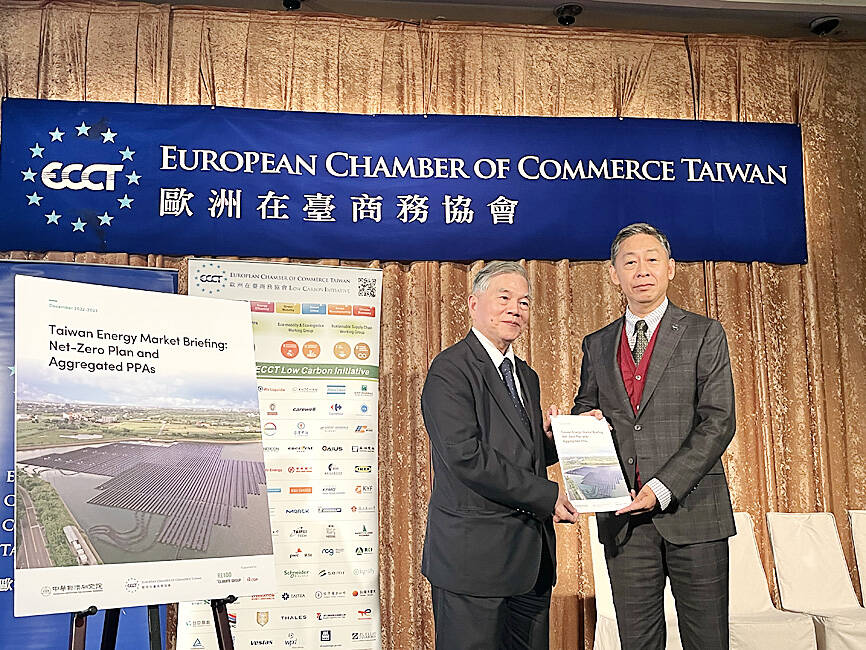Taiwanese companies are struggling to procure renewable energy domestically, as the grid is not meeting demand in terms of supply and access, meaning the nation would likely fall short of its renewable energy goals for 2025, the RE100 global initiative said in a report.
The report, titled “Taiwan Energy Market Briefing: Net-Zero Plan and Aggregated PPAs,” was released on Wednesday with the European Chamber of Commerce Taiwan. It was sponsored by Cathay Financial Holdings Co (國泰金控), Grape King Bio Ltd (葡萄王), Hua Nan Commercial Bank (華南金控), Taiwan Mobile Co (台灣大哥大) and PwC Taiwan (資誠聯合會計師事務所).
Demand for renewable energy has increased in the past few years, as RE100 members progress toward their targets, the report said.

Photo: Hsu Tzu-ling, Taipei Times
More Taiwanese companies have committed to using renewable energy, while heavy power consumers are being pushed through legislation to use more green energy, it said.
RE100 is a global initiative bringing together influential businesses devoted to using 100 percent renewable electricity at their facilities.
However, high costs and low supply remain the two biggest reasons for a lack of corporately sourced renewable energy in Taiwan, compared with two years ago when high costs, low supply and lack of market transparency were identified as the main barriers, the report said.
Bundled renewable energy certificates are expensive in Taiwan and corporate power purchase agreements are costly, as they require that buyers be large electricity consumers and sign 10 to 20-year contracts, it said.
That makes purchasing bundled renewable energy certificates economically not feasible, while corporate power purchase agreements are limited to a few companies that meet the requirements, it added.
The rules make most RE100 members with operations in Taiwan unable to pass the criteria, the report said.
One possible solution is an aggregated power purchase agreement (APPA) that would bring together two or more companies to negotiate and purchase renewable energy, it said.
By doing so, developers and purchasers would benefit from economies of scale, the report said, adding that corporations and stakeholders seem eager to join forces to overcome barriers that appear significant.
Vice Premier Shen Jong-chin (沈榮津) said that while APPAs would not necessarily reduce electricity costs and could involve longer contract periods, they might allow partner companies to achieve economies of scale.
He said he would ask the Bureau of Energy to look into the suggestion and brief him.
Government figures showed that renewable energy accounted for 6.3 percent of Taiwan’s total power supply last year, a slight increase from 5.8 percent in 2020, the report said.
While the government had previously committed to increasing the share of electricity generated from renewable energy sources to 20 percent by 2025, the report estimated that this goal was unlikely to be reached until 2026 or 2027.
Additional reporting by CNA

MULTIFACETED: A task force has analyzed possible scenarios and created responses to assist domestic industries in dealing with US tariffs, the economics minister said The Executive Yuan is tomorrow to announce countermeasures to US President Donald Trump’s planned reciprocal tariffs, although the details of the plan would not be made public until Monday next week, Minister of Economic Affairs J.W. Kuo (郭智輝) said yesterday. The Cabinet established an economic and trade task force in November last year to deal with US trade and tariff related issues, Kuo told reporters outside the legislature in Taipei. The task force has been analyzing and evaluating all kinds of scenarios to identify suitable responses and determine how best to assist domestic industries in managing the effects of Trump’s tariffs, he

TIGHT-LIPPED: UMC said it had no merger plans at the moment, after Nikkei Asia reported that the firm and GlobalFoundries were considering restarting merger talks United Microelectronics Corp (UMC, 聯電), the world’s No. 4 contract chipmaker, yesterday launched a new US$5 billion 12-inch chip factory in Singapore as part of its latest effort to diversify its manufacturing footprint amid growing geopolitical risks. The new factory, adjacent to UMC’s existing Singapore fab in the Pasir Res Wafer Fab Park, is scheduled to enter volume production next year, utilizing mature 22-nanometer and 28-nanometer process technologies, UMC said in a statement. The company plans to invest US$5 billion during the first phase of the new fab, which would have an installed capacity of 30,000 12-inch wafers per month, it said. The

Taiwan’s official purchasing managers’ index (PMI) last month rose 0.2 percentage points to 54.2, in a second consecutive month of expansion, thanks to front-loading demand intended to avoid potential US tariff hikes, the Chung-Hua Institution for Economic Research (CIER, 中華經濟研究院) said yesterday. While short-term demand appeared robust, uncertainties rose due to US President Donald Trump’s unpredictable trade policy, CIER president Lien Hsien-ming (連賢明) told a news conference in Taipei. Taiwan’s economy this year would be characterized by high-level fluctuations and the volatility would be wilder than most expect, Lien said Demand for electronics, particularly semiconductors, continues to benefit from US technology giants’ effort

‘SWASTICAR’: Tesla CEO Elon Musk’s close association with Donald Trump has prompted opponents to brand him a ‘Nazi’ and resulted in a dramatic drop in sales Demonstrators descended on Tesla Inc dealerships across the US, and in Europe and Canada on Saturday to protest company chief Elon Musk, who has amassed extraordinary power as a top adviser to US President Donald Trump. Waving signs with messages such as “Musk is stealing our money” and “Reclaim our country,” the protests largely took place peacefully following fiery episodes of vandalism on Tesla vehicles, dealerships and other facilities in recent weeks that US officials have denounced as terrorism. Hundreds rallied on Saturday outside the Tesla dealership in Manhattan. Some blasted Musk, the world’s richest man, while others demanded the shuttering of his